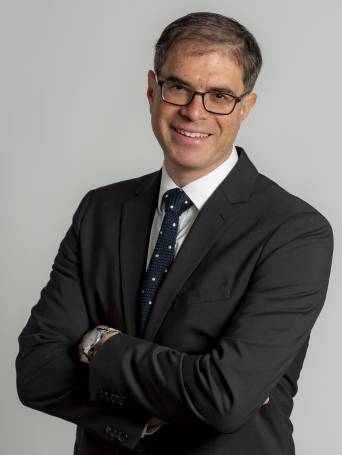Yehuda Sarna
Faculty Co-Director of Dual Degree Program (MPA-MA in Hebrew and Judaic Studies); Adjunct Associate Professor of Public Service

Yehuda Sarna serves as Executive Director of the Bronfman Center for Jewish Student Life at New York University, where he is also University Chaplain. He co-directs the Dual Degree Program (MPA-MA in Hebrew and Judaic Studies) and is an Adjunct Associate Professor of Public Service at the Robert F. Wagner School for Public Service. He is a Senior Fellow at the Of Many Institute for Multifaith Leadership at NYU, where he designs educational experiences and curricula to train the next generation in interfaith action.
Since 2019, Rabbi Sarna has served as the Chief Rabbi of the Jewish Council of the Emirates, a representative body of Jews living in the UAE since the turn of the 21st century. Before the community named him Chief Rabbi, Rabbi Sarnaministered to the synagogue of the first new Jewish congregation to be established in the Arab world in centuries that was located in an undisclosed villa in Dubai,. Today, he advises the Abrahamic Family House, a multifaith complex under construction in Abu Dhabi that hosts a mosque, church and synagogue, on matters of Jewish ritual law and multifaith space management. He teaches and lectures at NYU Abu Dhabi and regularly attends the Abu Dhabi Forum for Peace. In 2021, he contributed to the curation of the first permanent Holocaust exhibit in the Arab world at the Crossroads of Civilizations Museum in Dubai. An award-winning documentary, titled Amen-Amen-Amen, chronicles his work and the history of the Jewish community in the UAE, and aired on PBS in December 2021.
Rabbi Sarna was one of the principal subjects of Chelsea Clinton's 2014 documentary, Of Many, which premiered at the Tribeca Film Festival and aired nationally on ABC in 2017. The documentary is utilized nationwide as a teaching tool for universities and high schools that seek to establish norms of religious and spiritual diversity within their institutions. The Of Many Institute designed an award-winning training module, “Faith Zone,” to train university students, staff and administrators in religious literacy.
In 2016, Rabbi Sarna was appointed to the Muslim Jewish Advisory Council, a project of the American Jewish Committee and the Islamic Society of North America, which successfully lobbied for tougher legislation to address the underreporting of hate crimes. Rabbi Sarna has led or participated in numerous research groups, including Mapping Jewish Chaplaincy Strategic Planning Group (Brandeis University), The Warm Peace Institute (New York University), Countering Violent Extremism Through Arts and Culture (UAE Ministry of Culture and Knowledge Development), The Orthodox Forum Steering Committee (Yeshiva University), The Applied Research Collective for American Jewry (New York University) and the Community Relations Working Group (UJA Federation of New York).
In 2007, he founded the Jewish Learning Fellowship, a ten-week course in Jewish thought for college students, which now enrolls thousands of students through local Hillels on hundreds of university campuses. Rabbi Sarna is a member of the Council of European Rabbis, the Rabbinical Council of America, and the International Rabbinic Fellowship. He spearheaded the campaign to build an Eruv in Lower Manhattan and founded the Downtown Va’ad.
He is the editor of The Koren Shabbat Evening Siddur (2011) and the Orthodox Forum Series: Toward a Jewish Perspective on Culture (2013). Rabbi Sarna is married to Dr. Michelle Waldman Sarna, a psychologist, and they have six children.